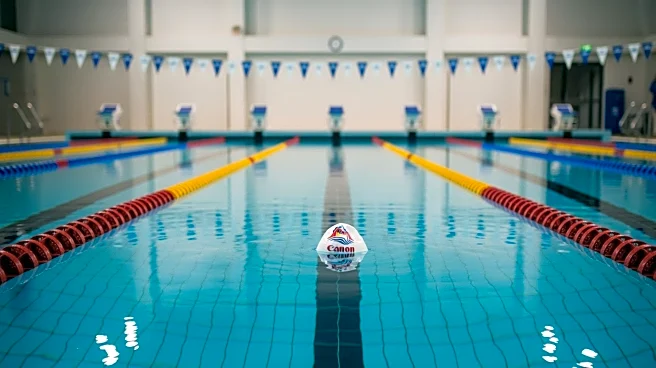What's Happening?
Ariarne Titmus, a prominent Australian swimmer and world record holder, has announced her retirement from competitive swimming at the age of 25. Titmus, who has been a leading figure in the sport, shared
her decision through an Instagram post, citing health issues and a desire to pursue other life goals. She last competed at the 2024 Olympic Games in Paris, securing a gold medal in the 200 freestyle and contributing to a record-breaking relay team. Titmus holds the world record in the women's 200 freestyle and has accumulated numerous medals throughout her career, including four Olympic golds. Her retirement marks the end of a significant era in swimming, as she plans to focus on supporting younger athletes and exploring opportunities in broadcasting.
Why It's Important?
Titmus's retirement is significant for the swimming community and Australian sports, as she has been a key competitor on the international stage. Her departure may impact Australia's performance in future swimming competitions, given her contributions to relay teams and individual events. The decision also highlights the pressures athletes face, balancing health and career aspirations. Titmus's move to support younger athletes could foster new talent in the sport, while her interest in broadcasting may influence media coverage of swimming events. Her retirement underscores the importance of athlete well-being and the transition to life beyond competitive sports.
What's Next?
Following her retirement, Titmus plans to engage with younger athletes, potentially offering mentorship and resources to those lacking support. Her interest in broadcasting suggests she may pursue a career in media, providing insights into swimming and sports. The swimming community may see shifts in team dynamics and strategies as they adapt to her absence. Titmus's influence could inspire discussions on athlete health and career transitions, prompting organizations to consider support systems for retiring athletes. Her legacy may continue to shape the sport, encouraging a focus on holistic athlete development.
Beyond the Headlines
Titmus's retirement raises broader questions about the sustainability of competitive sports careers and the importance of mental and physical health. Her decision reflects a growing trend among athletes prioritizing personal well-being over prolonged competition. This shift may influence sports organizations to reevaluate their support structures, ensuring athletes have pathways to transition smoothly into post-competitive life. Titmus's advocacy for younger athletes could lead to increased investment in grassroots programs, fostering a new generation of swimmers. Her potential role in broadcasting may also impact how swimming is presented to audiences, potentially increasing engagement and interest in the sport.










